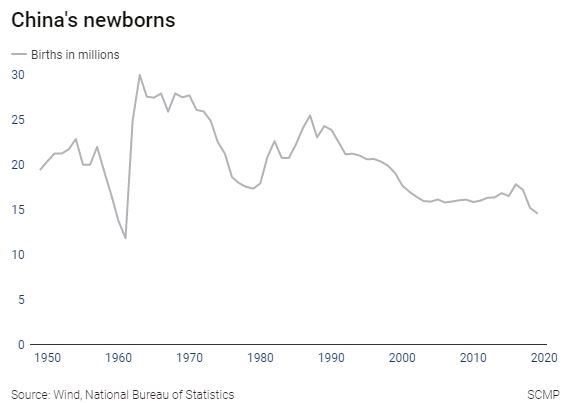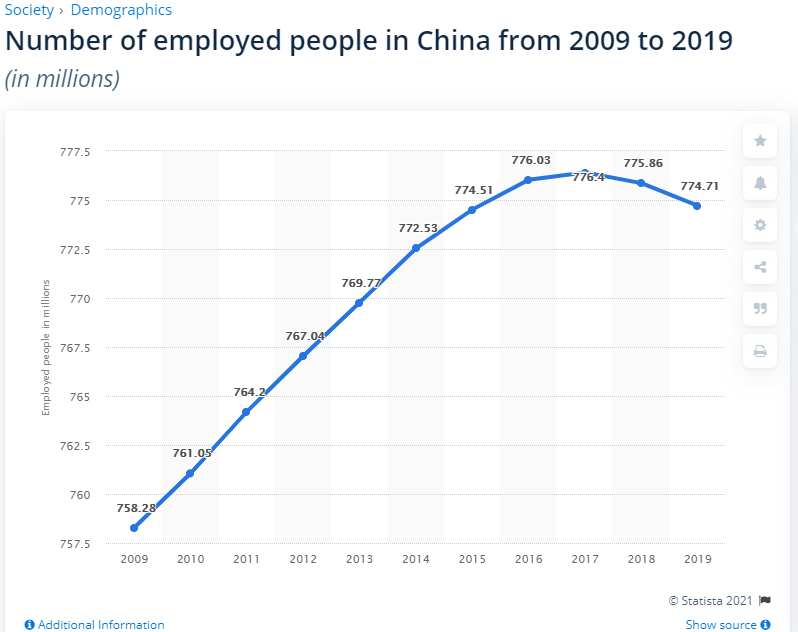Zapiski z Chin » Azja, Chiny, Różne » Po angielsku – o generacji Y i Z
Po angielsku – o generacji Y i Z
Tym razem zamieszczam wpis po angielsku, który przygotowałem z myślą o LinkedIn i szerszej publiczności (w większości anglojęzycznej). Wpis uważam (cóż za niespodzianka 😉 ) za ciekawy, bo próbujący odpowiedzieć na pytanie, skąd problemy Chin z ludźmi do pracy w fabrykach. Hipoteza, jaka stawiam, jest taka, że jest to spowodowane dojściem do głosu (czytaj: większościowemu udziałowi w rynku pracy) pokolenia generacji Y (urodzonych miedzy 1980-1995) i generacji Z (urodzonych między 1996 a 2010/16) – generacji, dla których stare motywacje nie mają większej wartości.
— — — — —
Understanding China’s Generation Y and Generation Z
Recently I got into interesting discussion on outlook of manufacturing in China and China as world’s factory. Conclusion of those discussion was that China is facing many structural problems and although is trying to find right approach to address them, it cannot be sure of success, at least for now.
What are those problems?
First one, which I wrote about on my blog (sorry, it’s in Polish) is its ageing population. Recent years brings China lowering birth rates (in 2020 15% less kids were born compared to 2019, it was 10milion births in 2020, 11.8million in 2019 and 15.2million in 2018 – it is big decrease and bigger, than it was observed in Japan, which is commonly regarded as country with ageing population).

źródło: South China Morning Post
Those decreasing birth rates impact availability of workforce – and that is the second problem. Only between 2021 and 2025 it is expected that roughly 7 million people will ‘disappear’ from the market. It is a fact, that factories have more and more problems finding people – we talk here about workers working in assembly lines, doing repetitive work, but without whom most businesses couldn’t operate. Young people are not interested in such jobs. Work, done by their parents, is not work they want. They don’t want to work boring, repetitive jobs in hot, dirty workshops. All those factories with ‘dirty’ processes face problems with labor.

źródło: https://www.statista.com
Is the automation then the answer? It is part of the answer, but automation will not miraculously solve all problems. You need to have volume to make automation viable option. If you have a lot of customizations, automation may not always be best solution. And you need people to operate those machines, which may cost you a lot (its not uncommon that in order to replace 3-4 workers you may need to pay their combined salary to your new engineer – who by the way may not be interested in working overtime or after official working hours (which was kind of norm).
What is the reason for this problem of availability of workers?
My hypothesis is, that is a natural consequence of new generations becoming more dominant – namely generation Y and, maybe even more, generation Z.
For those who are not familiar with that concept, short explanation. As people are generally lazy, we try to simplify things around us. So did scientist (sociologists in this case) and came with this concept of generations. It helps us to break down more complex problems, find some points of differentiations and then think about how to tackle them.
So, speaking of various generations, we have (I’m focusing here on China):
Traditionalists (born between 1928-1945)
- Witnessed Sino-Japanese war (largest war in Asia in XX century)
- Witnessed establishment of PRC (People’s Republic of China) in 1949
- Been part of Mao Zedong’s reforms: ‘big push’ to industrialize China, in 1958 – ‘Great Leap Forward’
- Worked hard and lived in poverty
Boomers / Lost generation (1946-1960)
- Went through Great Proletariat Cultural Revolution (rooting out traditional Chinese culture – anything ‘old fashioned’ was not wanted)
- Poverty – continued, received no education as education system collapsed
- Cult of Mao, were part of Red Guards, brought up by Little Red Book
- Many were not prepared to life after death of Mao, as left without education and plans for future (that’s why sometimes referred to as lost generation)
Generation X (1961 – 1979)
- Growing up during economic reforms and openness
- Export sectors developing rapidly – many businesses have started then, education and hard work were in demand again
- Beginning of consumer society
Generation Y (born 1980-1995)
- Little emperors, single kids (China’s one child policy implemented in 1979), high self-esteem and confidence
- High pressure from parents and grandparents as they are only kids in family and therefore all attention is on them
- Witnessed growth of digital and global economy – technologically advanced
- Not afraid to work, but expect recognition for it
- Want to have ownership and control their own work
- Require constant feedback
- Employment flexibility (changing jobs regarded as normal behavior)
- National pride (they witnessed return of Hong Kong to China in 1997 and Macau in 1999, China joining WTO in 2001, Beijing Olympic games in 2008)
Generation Z (born 1996-2010/16)
- Digital generation / media generation
- Confidence / freedom / individuality (focus on individual style) / dependency on technology
- Values authority and discipline if given solid purpose
- Impatient
- More socially conscious (topics around social responsibility important to them)
- optimistic attitude
- stronger family dependency
- lower willingness to save (to the extent of carefree spenders)
Now, I will focus on last 2 generations, that is Y and Z. Firstly, let’s see what differences between those 2 generations are:
- Gen Y – technology experts (they can use technology and know alternatives), Gen Z – technology dependent (not aware of alternatives – assuming that digital is all there is)
- Gen Y – goes online, while gen Z – lives online (more socializing online than offline through streaming, video chatting)
- Gen Y seeks freedom and flexibility, while Gen Z security and stability
- Gen Y is not that interested in internal rewards/ internal motivation (content of work, satisfaction, pleasure, diversity, creativity), but in external (salary, benefits), while for Gen Z external rewards have lower value – meaningful job is most important
- Gen Z thinks more than Gen Y that it is important to be unique, creative and have own style (although slightly confusing may the fact that Gen Z finds inspiration through friends, celebrities and influencers)
- Gen Z, more than Gen Y, claims to be more socially conscious consumers, expect companies to adhere to high standards
When we see those summaries of both Gen Y and Z it is becoming now more obvious, why traditional manufacturing sector will have more problems in finding workers for their boring, tedious jobs.
While with generation Y you may still convince people by motivating them with external rewards (salary/benefits), although it is also becoming more difficult and it is not uncommon now to see workers in their 50s working in assembly lines, it will be almost impossible to convince Gen Z to work those jobs. It’s not creative (it’s repetitive), its not unique, its just not digital enough.
You may have engineers willing to work with robots, but do not expect them to work long hours and without any leaves/holidays. It’s no longer about money – you will not motivate Gen Z by money, they may decide to choose worse paid job, but with more flexibility.
źródło: research “A generation without borders. Embracing Generation Z” available at www.occstrategy.com
And be careful as those topics around social responsibility are important to Gen Z, they may not be willing to work for companies struggling to meet increasing requirements.
— — —
Some of sources I used in preparation for this text:
- “How to motivate generation Y with different cultural backgrounds – a cross-cultural comparison between China and Sweden”, Kristianstad University, Authors: Aroonwan Karefalk, Maria Pettersson, YeQing Zhu
- New Perspectives and Studies in Economics and Administrative Sciences (pp.135-146), “Motivational differences between generations Y and Z in working life”
- “A generation without borders. Embracing Generation Z”, research done by OC&C Consultants, www.occstrategy.com
Wpis z kategorii: Azja, Chiny, Różne · Tagi: blog o Azji, blog o Chinach, China, Chiny, Gen Y in China, Gen Z in China, generation Y, generation Y in China, generation Z, generation Z in China, labor shortage China, Polacy w Azji, Polacy w Chinach, Polacy w Szanghaju, Polak w Azji, Polak w Chinach, Wojciech Szymczyk, Wojtek Szymczyk, zapiski z Chin, Zapiski z Panstwa Srodka









Z moich obserwacji (dotyczących sektora związanego z edukacją) wynika, że pokolenie Z to niedorobieni idioci, którzy nie szanują szefów, bo to stare pryki, współpracowników, bo tylko ja jestem genialny, a w dodatku nie potrafią wziąć odpowiedzialności ZA NIC! – bo wszyscy inni są dla mnie tacy niedobrzy, a ja tak się staram przecież. Oczywiście są wyjątki, ale jest ich tak niewiele, że mój organizm wykształcił już alergię na chińskich milenialsów.
BaiXiaoTai – widze, ze doswiadczenia z pokoleniem Z masz nienajlepsze 🙂 Ja troche lepsze doswiadczenia mam, choc zgadzam sie, ze styl zarzadzania tym pokoleniem rozni sie, tak jak i ich wartosci roznia sie od tych wyznawanych przez starsze pokolenia. Trzeba tez ich inaczej motywowac i duzo komunikowac. Cierpliwosci zycze i powodzenia!
Mówisz, że cierpliwość, dużo komunikacji i motywacja podziałają? Bo wiesz, mam pięcioletnią córkę i z nią to faktycznie skutkuje, ale sądziłam, że od dorosłych ludzi mogę wymagać nieco więcej…
Problem jest bardziej złożony – wynika w ogóle z przemian społeczno- politycznych. Widać to na przykładzie zmian pokoleniowych w Polsce. Zmiany polityczne w Polsce stworzyły tzw. otwarcie na wartości zachodnio- amerykańskie- cokolwiek to znaczy. W takiej bardzo uproszczonej obserwacji- zmiana warunków ekonomicznych – oczywiście polepszenie stworzyło obu pokoleniom zupełnie inny start. I o ile pokolenie Y wyrastało jeszcze w poszanowaniu wartości “starych” to już obserwowało się radykalne zmiany i przewartościowywanie tych wartości. No i co się stało – następne już pokolenie Z wyrastało zgodnie z koncepcją “róbta co chceta” – roszczeniowo i bez konieczności pracy- na przykład deprecjonowanie szkoły- stworzyło chyba już nowy model “inteligenta”- a szkoły zwane wyższymi w myśl zasady ” ilość a nie jakość” dały tytuły wszystkim jak leci- byle tylko opłacili czesne.. No i tak bez pracy – z ogromnymi oczekiwaniami – weszło nowe hiper konsumpcyjne pokolenie.
Zastanawiam się tylko kiedy się nam to odbije czkawką:)
Ale może rzeczywiście trzeba spokojnie tłumaczyć, że na wszystko co się ma składa się praca- czasem łut szczęścia.
BaiXiaoTai 🙂 Innej rady nie znam – albo mozna zmienic sposob komunikacji/motywacji (majac przy tym sporo cierpliwosci), albo – jesli te pierwsze nie dzialaja – zmienic ludzi, jesli naprawde nie mozna do nich dotrzec a i oni nie chca uczynic zadnego wysilku. I pamietac – to mi jeden z moich lepszych szefow mowil – ze wszyscy pracownicy uwazaja, ze potrafia zrobic wszystko lepiej od szefa/przelozonego, poza jednym – wzieciem odpowiedzialnosci za decyzje, ktore to szef/przelozony podejmuje. No ale z tym trzeba zyc 😉
Problem się pojawia, gdy nie jestem szefem tylko współpracownikiem i nie mogę ich zmienić 😉 Ostatnio ponieważ ośmieliłam się zwrócić młodzieży uwagę, spróbowała mnie “ukarać” nie włączając mnie w grafik w tym tygodniu. Ależ się martwię, że mam tydzień wakacji! 😀
Stas – zgoda, ten dobrobyt na niektorych podzialal tak, ze wydaje im sie, ze wszystko moga (i potrafia lepiej od innych – to zreszta nie dotyczy jedynie pokolenia Z 😉 ). Dla wiekszosci zderzenie z rzeczywistoscia przychodzi szybciej czy pozniej i jest mniej lub bardziej bolesne. Mimo wszystko jestem optymista (widzac wszystkie problemy), bo z wiekszoscia jeszcze nie jest tak zle – pod ta poza wyluzowanych i wiedzacych wszystko lepiej mimo wszystko sa ludzie, ktorzy sluchaja jak sie do nich mowi sensownie.
A co do masowego wydawania dyplomow – tu powinno sie w piersi uderzyc pokolenie X albo i boomer’si – bo to to pokolenie zakladalo te ‘szkoly zwane wyzszymi’ i to ono dawalo te papiery.